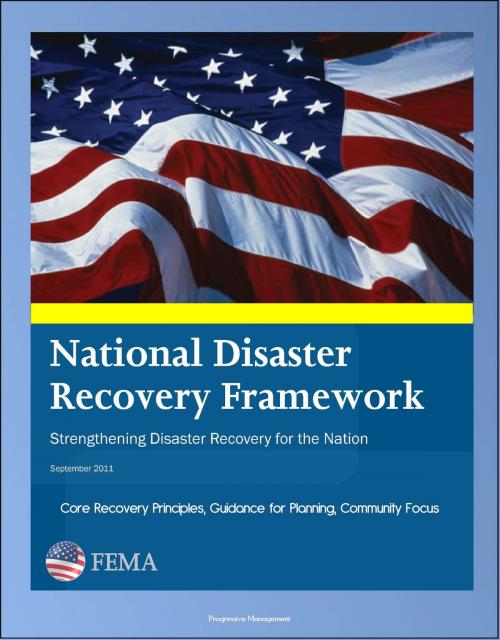FEMA National Disaster Recovery Framework (NDRF) - Strengthening Disaster Recovery for the Nation - Core Recovery Principles, Guidance for Planning, Community Focus
Nonfiction, Social & Cultural Studies, Social Science| Author: | Progressive Management | ISBN: | 9781301019861 |
| Publisher: | Progressive Management | Publication: | September 7, 2013 |
| Imprint: | Smashwords Edition | Language: | English |
| Author: | Progressive Management |
| ISBN: | 9781301019861 |
| Publisher: | Progressive Management |
| Publication: | September 7, 2013 |
| Imprint: | Smashwords Edition |
| Language: | English |
Experience with recent disaster recovery efforts highlights the need for additional guidance, structure and support to improve how we as a Nation address recovery challenges. This experience prompts us to better understand the obstacles to disaster recovery and the challenges faced by communities that seek disaster assistance. The National Disaster Recovery Framework (NDRF) is a guide to promote effective recovery, particularly for those incidents that are large-scale or catastrophic. The NDRF provides guidance that enables effective recovery support to disaster-impacted States, Tribes and local jurisdictions. It provides a flexible structure that enables disaster recovery managers to operate in a unified and collaborative manner. It also focuses on how best to restore, redevelop and revitalize the health, social, economic, natural and environmental fabric of the community and build a more resilient Nation.
The NDRF defines: Core recovery principles; Roles and responsibilities of recovery coordinators and other stakeholders; A coordinating structure that facilitates communication and collaboration among all stakeholders; Guidance for pre- and post-disaster recovery planning; The overall process by which communities can capitalize on opportunities to rebuild stronger, smarter and safer. These elements improve recovery support and expedite recovery of disaster-impacted individuals, families, businesses and communities. While the NDRF speaks to all who are impacted or otherwise involved in disaster recovery, it concentrates on support to individuals and communities.
The NDRF introduces four new concepts and terms: Federal Disaster Recovery Coordinator (FDRC); State or Tribal Disaster Recovery Coordinators (SDRC or TDRC); Local Disaster Recovery Managers (LDRM); Recovery Support Functions (RSFs). The FDRC, SDRC, TDRC and LDRM provide focal points for incorporating recovery considerations into the decisionmaking process and monitoring the need for adjustments in assistance where necessary and feasible throughout the recovery process. The RSFs are six groupings of core recovery capabilities that provide a structure to facilitate problem solving, improve access to resources, and foster coordination among State and Federal agencies, nongovernmental partners and stakeholders. Each RSF has coordinating and primary Federal agencies and supporting organizations that operate together with local, State and Tribal government officials, nongovernmental organizations (NGOs) and private sector partners. The concepts of the FDRCs, SDRCs, TDRCs and RSFs are scalable to the nature and size of the disaster.
Experience with recent disaster recovery efforts highlights the need for additional guidance, structure and support to improve how we as a Nation address recovery challenges. This experience prompts us to better understand the obstacles to disaster recovery and the challenges faced by communities that seek disaster assistance. The National Disaster Recovery Framework (NDRF) is a guide to promote effective recovery, particularly for those incidents that are large-scale or catastrophic. The NDRF provides guidance that enables effective recovery support to disaster-impacted States, Tribes and local jurisdictions. It provides a flexible structure that enables disaster recovery managers to operate in a unified and collaborative manner. It also focuses on how best to restore, redevelop and revitalize the health, social, economic, natural and environmental fabric of the community and build a more resilient Nation.
The NDRF defines: Core recovery principles; Roles and responsibilities of recovery coordinators and other stakeholders; A coordinating structure that facilitates communication and collaboration among all stakeholders; Guidance for pre- and post-disaster recovery planning; The overall process by which communities can capitalize on opportunities to rebuild stronger, smarter and safer. These elements improve recovery support and expedite recovery of disaster-impacted individuals, families, businesses and communities. While the NDRF speaks to all who are impacted or otherwise involved in disaster recovery, it concentrates on support to individuals and communities.
The NDRF introduces four new concepts and terms: Federal Disaster Recovery Coordinator (FDRC); State or Tribal Disaster Recovery Coordinators (SDRC or TDRC); Local Disaster Recovery Managers (LDRM); Recovery Support Functions (RSFs). The FDRC, SDRC, TDRC and LDRM provide focal points for incorporating recovery considerations into the decisionmaking process and monitoring the need for adjustments in assistance where necessary and feasible throughout the recovery process. The RSFs are six groupings of core recovery capabilities that provide a structure to facilitate problem solving, improve access to resources, and foster coordination among State and Federal agencies, nongovernmental partners and stakeholders. Each RSF has coordinating and primary Federal agencies and supporting organizations that operate together with local, State and Tribal government officials, nongovernmental organizations (NGOs) and private sector partners. The concepts of the FDRCs, SDRCs, TDRCs and RSFs are scalable to the nature and size of the disaster.















